Wild camping – Safety tips shared by 6 experienced solo female cyclists
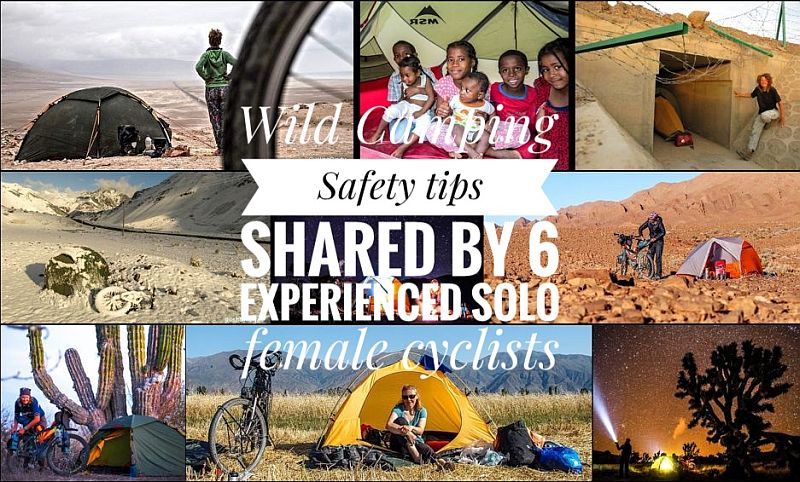
#1 What makes for a safe wild campsite?
Ewa Świderska – Poland (over 40) – 5 years – 80.000 KM – 40 countries – ewcyna.com
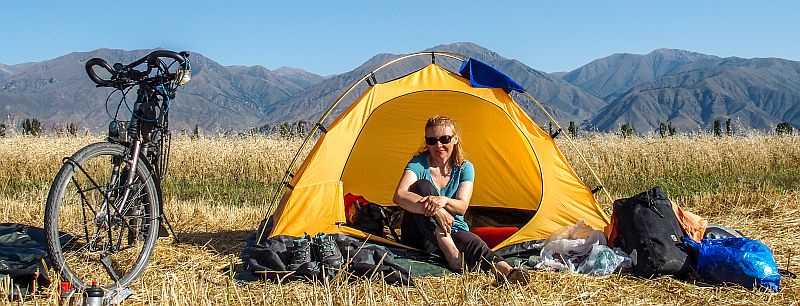
Ewa:
I usually look for a wild camp spot when it’s getting dark and I try to make myself invisible. I just cycle and look around, if I see a place or a small road/path turning from the bigger one I take it making sure no one sees me.
I switch off my lights then. It’s all about going unseen. Sometimes I check on Google satellite maps where the nearest houses are and I try to be somewhere not far from those houses just in case I need help. But I still like to be far enough away so dogs cannot hear or smell me.
Kathryn Zimmerman (68) – USA – Kathryn’s Facebook page
Kathryn doesn’t count kilometers – has been cycling for the last 8 years in 16 countries
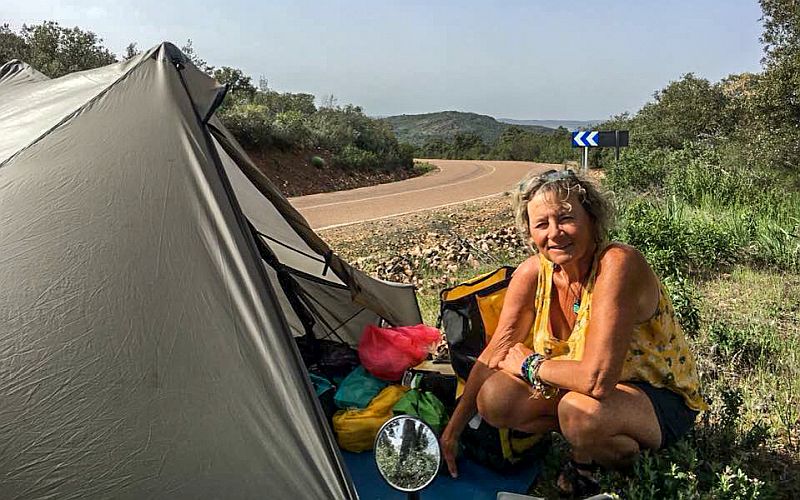
Kathryn:
I start looking for a spot that is flat, my number one criteria. Something on the edge of a field or in a clump of trees where I will not damage a farmer’s crop. Some place where folks won’t care if they find me camped because I’m not hurting property. I like to nestle up against trees or rocks to feel grounded.
I don’t hide. I feel I’m safer where I can be seen because if someone wants to harass me, they have to worry about other cars coming by and catching them.
I also like a spot with sunset and sunrise on me, if possible. Hard to judge where the sun will set and rise and sometimes, I get it wrong.
I prefer to be away from towns especially in countries where people are more aggressive in making contact with me. I’m also tired at the end of the day and don’t feel like being social. I rarely ask permission. Easier to ask forgiveness if the property owner comes by. And they usually are excited about what I’m doing.
Sometimes the police stop to talk and see what I’m doing or get my story. Only in NZ did they make me move, once. I argue about moving saying I don’t ride on the roads at night because it’s too dangerous but I’ll be gone in the morning.
Blanca Fernandez (60) – Spanish – 38.000 KM – 37 countries – blancaonabike.com
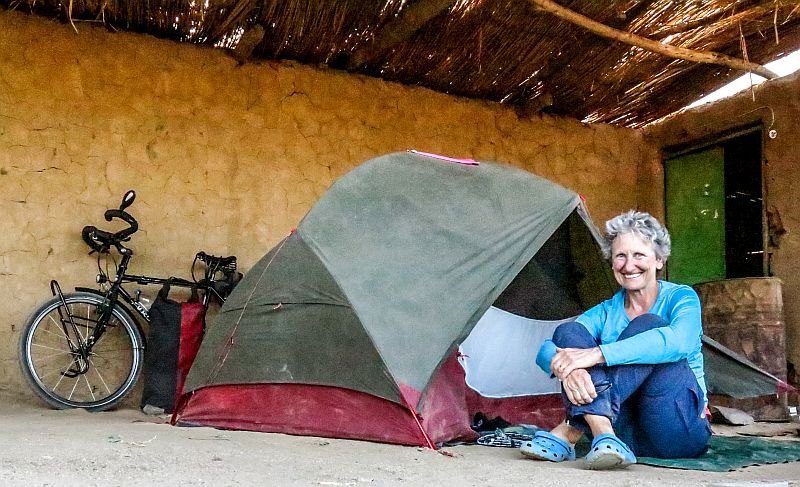
Blanca:
When looking for a place to camp I look for places that are on higher ground than the road and where I am not in line with the lights of traffic. Higher ground because naturally drivers don’t look up and out of the line of traffic for obvious reasons!
I try to get a couple hundred meters away from the road, turning off it when no-one can see me doing it. Wooded/shrubby areas are good because you can hide behind trees/shrubs.
When I do this I always cook and eat before I camp to avoid unnecessary noise/light/movement that could potentially attract attention. (I have the MSR Dragonfly which is extremely noisy!) I like to read for a bit before I go to sleep and I have a supply of audio books to avoid unnecessary light.
When going down a side track, I try to find one that looks like it hasn’t been used for a while, for example where long grass has grown between the wheel tracks and if near villages I sometimes backtrack and with some branches erase my tire tracks and my footsteps.
Cinderella Servranckx (46) – Netherlands
6 years – 48 countries – approx 50.000 KM – cyclingcindy.com
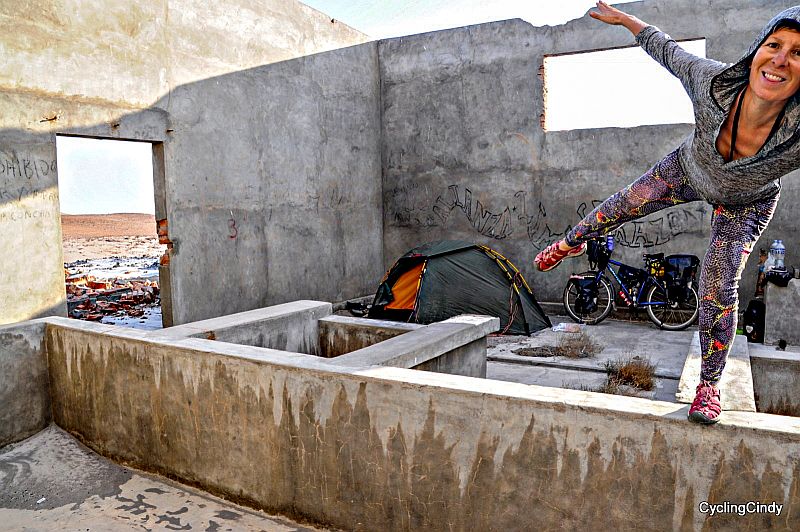
Cindy:
One of the facets of long-term cycle touring is camping. Not at paid campsites but in nature, where it is magical and enchanting, arousing all my adventurous senses. Yet, it takes practice to gain confidence and experience is needed to be bold and to feel secure.
You might not always be able to find the right place to camp but my experience has taught me that in the end there is always a spot to pitch a tent. I just lower my standards for the night and might even end up in someone’s back garden or at the edge of a helicopter platform in the middle of a city, or who knows where.
Finding places to camp is decided by a few factors but the most important is that neither I am seen nor that people are prone to walk past. I want my camp spots to be solitary and private. Deserts and high plateaus are usually good in this way, but the woods can be a different story.
I focus on lonesome patches of woods, checking first for paths or trails crossing through or too near to a possible campsite. Gates are often only seemingly locked and thus easy to open. I am also on the lookout for breaks in barb-wire fences.
If camping near man made structures a sign that a place is truly abandoned, is for instance the absence of laundry hanging out or of recent clipping and cutting of grass, shrubs or trees. I pitch my tent way past rubbish piles and make sure the spot I am at is not a popular hangout for local youngsters.
Dorothee Fleck (56) – Germany – 180.000 KM – 98 countries cycled womenscyclingguide.com
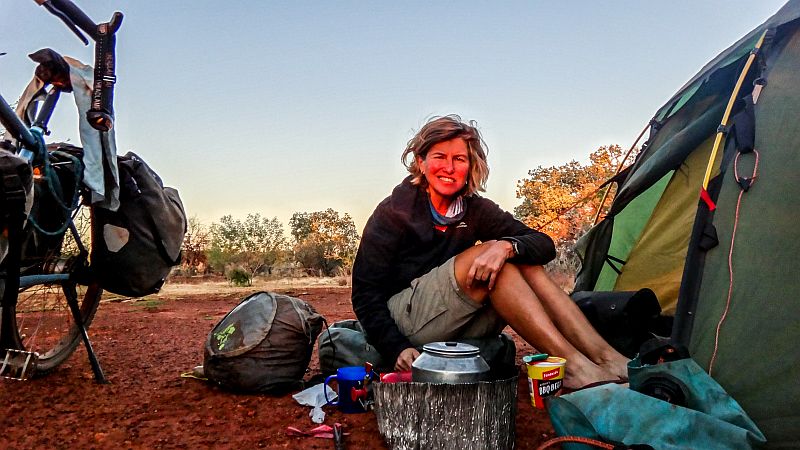
Dorothee:
What I enjoy most when cycling is my endless freedom. To go wherever I want and to stop whenever and wherever I want. Camping and especially wild camping is essential for me. I don’t want to be under pressure to reach a place with “official” accommodation. Also, nowadays campgrounds are rather parking places for campervans than places where you can put up a tent.
In former times I was jealous of women who were touring with a male partner. I thought wild camping was too dangerous for a woman alone. After I also toured a couple of days with another cyclist, I discovered he wouldn’t be a big help if somebody wanted to attack me anyway.
Then I started to wild camp alone and enjoyed it.
My prerequisites for a camp spot are: Not visible from the road and not accessible by car. With time you get more and more experienced and you acquire something like a sixth sense. Sometimes I continue because my gut feeling tells me this is not a good place for camping.
I hardly ever make a camp fire because I don’t want to attract any bodies attention. Even with all my experiences and precautions I never can be 100% safe. But where are you ever 100% safe?
Myself – Heike Pirngruber – (46) – 75.000 KM – 6 years – 57 countries cycled
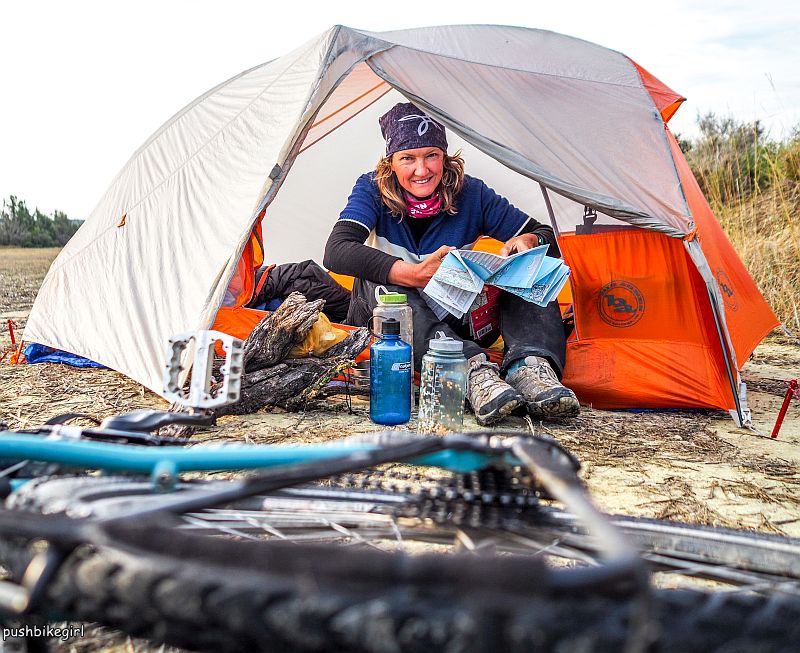
Heike:
How and if I wild camp really depends on the country, I am cycling in. If I am feeling safe and I am in a populated area, I often ride a long time after dark before I decide where to camp. Mainly because I like riding in the dark. Darkness also reveals where the lights of houses, cars and street lamps are and I can see where movements might be at night. I prefer to hide myself even in safe countries. Being invisible offers freedom.
I can also be very cheeky, pitching my tent between houses, in parks, in ruins, unfinished houses, behind walls, sports grounds etc. If I do that, I switch off all my lights, and rarely use my headlamp – if so, only the red light. Less out of fear, more so to avoid being bothered and it gives me the feeling of having my own little home for the night.
I make 100% sure that a car won’t be able to drive into me accidently. If I am in doubt, I try to find barriers, like rocks, logs or even my bike and then place them around or in front of my tent. Another real concern are drunks, who might show up in the night. This is one reason why I never camp where there are bottles or cans laying around. I also avoid campfire pits or other signs of night time activities.
In open country, in the desert or in the forest where there are endless possibilities to camp and hardly ever someone stumbles upon your path, I camp shortly before darkness. So, I still have time to collect fire wood and find a flat and pretty spot, where I can see the sunset colors and get the first sun in the morning. But only if it is a cold morning – if it is a hot destination I camp where there is shade as long as possible.
In areas where I don’t feel safe, I start looking for a spot long before dark. This gives me more time just in case I can’t find anything. I can still ride on for a while, maybe finding a hotel or knocking at a door to ask for shelter.
In those areas I stay away from towns. I sometimes check out a spot in daylight and come back when it is dark to make sure no one can see me leaving the road. I make sure I am far enough from the road and hide behind trees or bushes.
In general, I try to stay away from noise. Dogs barking all night or the autobahn next to my tent isn’t very appealing to me.
I avoid pitching my tent on grass as it can leave you with a wet tent in the morning.
Checking for signs of creatures is another habit. Ants, rabbit holes, snakes, live stock etc. Preferring to avoid holes being chewed in my tent by those in search of food or a warm bed mate. Cows grazing too close can be annoying and I would rather not have them wrapped up in my tent or guy-lines.
I respect private property but I am easier when it comes to using public places.
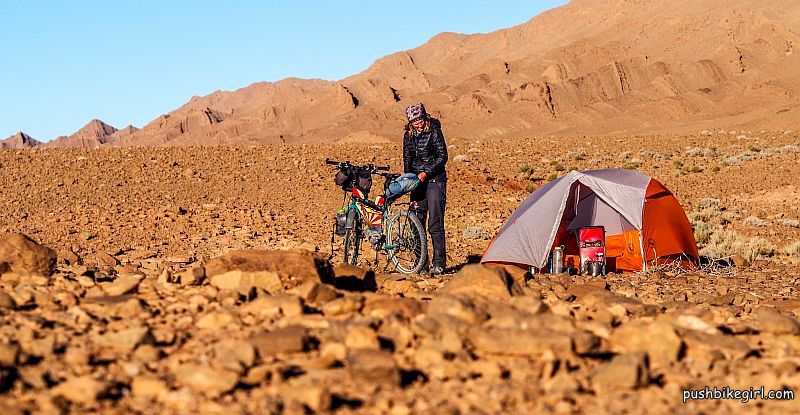
#2 Personal Safety Rules
Ewa:
One of my rules is that if someone discovers my spot I will usually pack up and go (unfortunate, because usually I’m tired and it’s late). You never know what will come to their mind and whether or not they will want to pay a visit later on, alone or with colleagues.
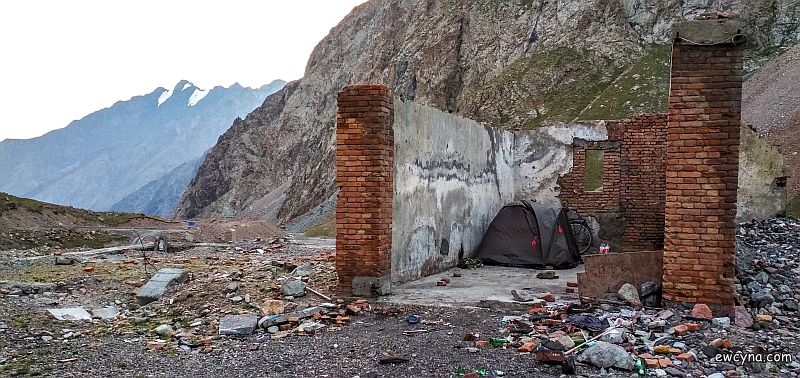
Kathryn:
It’s a much safer world out there than the news would have you believe. I camp in the open and don’t hide. I believe there’s safety in that. I greet people that stare with a smile and a wave to alleviate their concerns. I want the locals to not fear me.
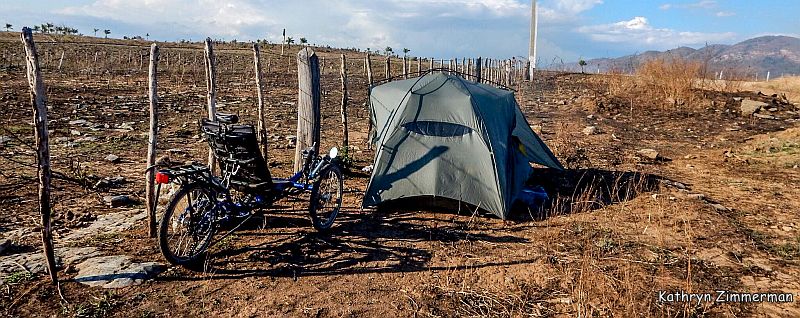
Blanca:
The golden rule I follow when looking for a place to camp is: Camp where everybody can see you or where nobody can see you AND I always trust my gut about a place. Sometimes I use the app iOverlander to see what other people suggest and I have found some really nice spots that way.
As a rule of thumb, I never camp in dry river beds especially if it threatens rain as there could be flash floods, or, if by the sea/lakes, where I can see signs of tide coming up. The same applies to places where there could be landslides. And of course, I never trespass.
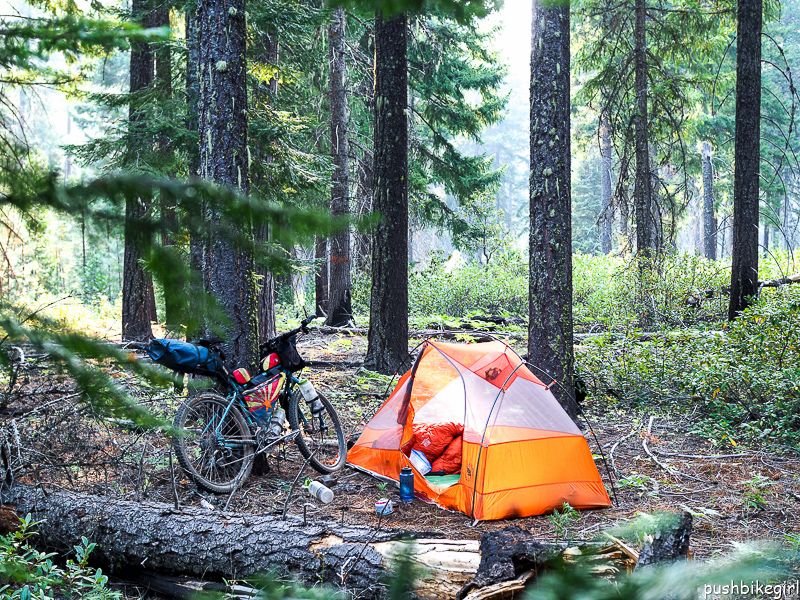
Cindy:
Of course, when trespassing I am aware that I’m doing something which is not allowed. I am crossing a line, taking a chance, knowing that I can get caught, sent off or even worse. Therefore, I try to keep my stay kosher: no campfires and nothing left behind.
I make sure my toilet is one that won’t quickly be discovered, always covered by sand or stones. I also rely on the fact that I am a little, single woman and most men feel a sort of compassion. My overall demeanor when trespassing, is a submissive one. I frequently found it necessary to trespass while in South America.
When out in the desert, lonesome beaches or high rocky pastures it can happen that someone will rise up out of seemingly nowhere, either so-called drop-outs who live in the wilderness, a shepherd with his herd of lamas or someone you are just not certain about.
When this happens, I choose not to play the part of the overly friendly woman. I loose little by showing displeasure at this sudden company. Enthusiastic behavior accompanied with lots of smiling often implies something very different to lone males. Especially in certain countries where cultural implications vary, just being alone is enough reason to be seen as easy bait.
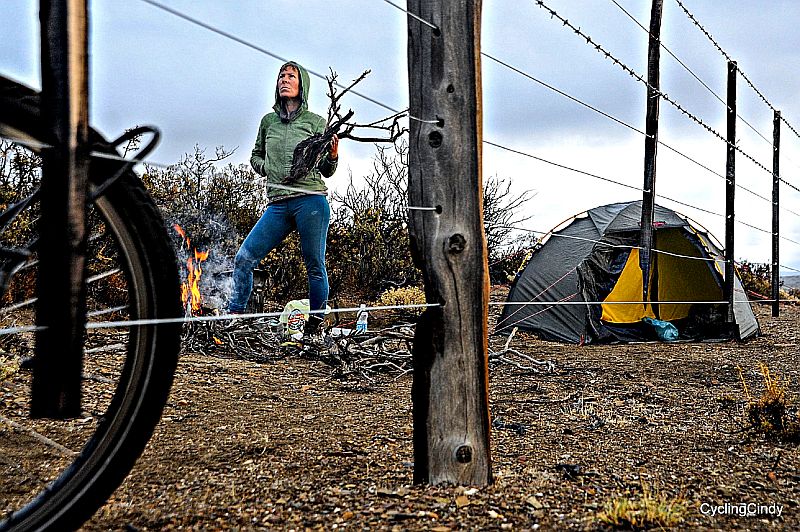
Heike:
Either a lot of people have seen me or no one! When a lot of people know where you are, I believe no one will attack you. But this only counts for small towns not for cities. I hardly ever pitch my tent in cities. Only in very safe areas.
I stay away from drunk people. In countries where there is a lot of alcohol, I avoid staying close to towns at the weekend. Rather making sure I am somewhere in nature.
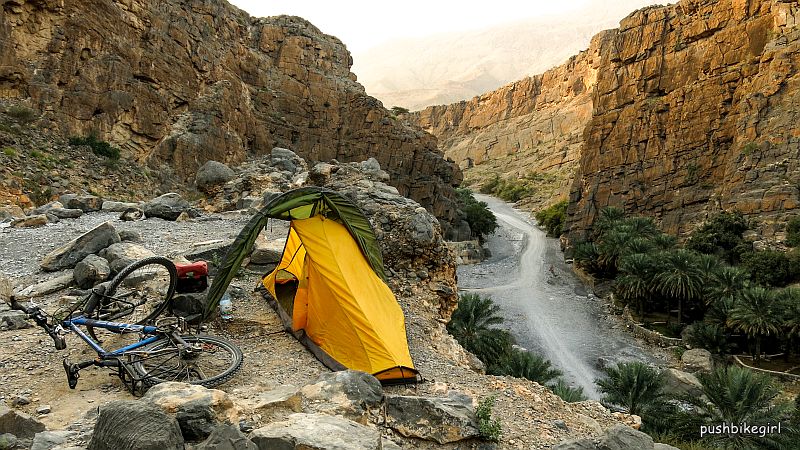
#3 No Safe Spots? Where Now?
Kathryn:
I camp in cemeteries, churchyards and town parks, too. Industrial parks in the US are good too. They have nice lawns. But beware of sprinklers!!
If I can’t find a good camping spot I would knock on a door and ask for permission to camp in their yard. I’ve done this only once or twice, I think.

Blanca:
Whilst I do wild camp if I have to, by far my preferred option is to ask locally whether I can pitch my tent next to someone’s dwelling. I found that I sleep much better that way.
For a while I thought this was a cop out, I read/heard so much about the joys of wild camping that I felt I wasn’t being adventurous enough and I made myself wild camp. The result was that I slept badly, the smallest noise got magnified in my mind and sometimes even my own breathing sounded like there was someone outside my tent!!!
In very populated countries like Ethiopia or Malawi it is hard to find a place as there are people everywhere.
What I do then is turn up somewhere and ask. I normally have a photo of the tent handy and use sign language to indicate I want to sleep and will only stay one night. In places where they speak English, I explain how important it is for me to feel safe as a woman travelling on my own. Although in my mind I’m always prepared for a refusal, it’s their space after all and they don’t have to say yes, the reality is that l I have always received kindness and hospitality.
Before I ask, I always check that there are women and children around which is the case in most villages but not in some nomadic /shepherd communities where I check for children’s/women’s clothes hanging on a line or children playing outside houses/tents. Also, I camp in fairly open, public spaces, I would never go inside someone’s enclosed garden for example.
The advantage of sleeping next to people is that normally there is a source of water nearby, a latrine, I don’t have to worry about not being seen because the whole village knows you are there and once permission is granted those giving it take some level of responsibility over your safety.
I have slept in villages, temples, next to the tent of Tibetan nomads, police stations, rural health centers, schools, farms, family compounds, petrol stations, churches…
Of course, there are cons to this approach. Once you’re in a public space you become the center of attention and you can kiss goodbye any privacy and you need to be prepared to be on display whilst you are pitching your tent, cooking, eating and this can be tiring after a while.
However, I have had some wonderful experiences this way: being offered freshly made yak yogurt in China, listening to the chant of Monks in Laos, hearing the first cry of a new born baby in Zambia, being the guest of honor at a village festivity in Vietnam, invited to talk to a school assembly in Kenya and witnessing the waking up of a village in Ethiopia…
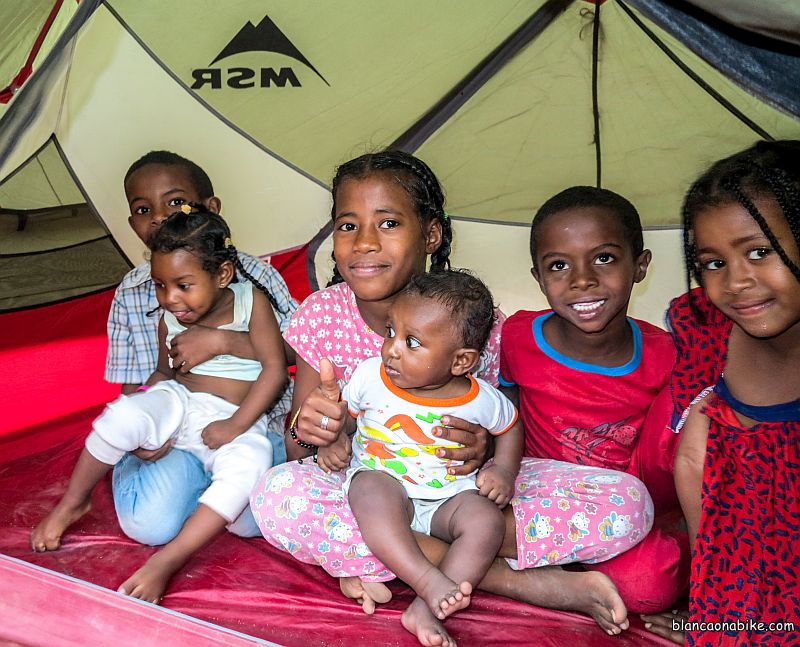
Dorothee:
If I don’t find a safe spot or if there are too many people around, I ask locals where I can pitch my tent. In most African countries you can ask at schools, hospitals, police stations and churches. Or just ask for the chief of the village he always will have a spot for you. As a guest of the chief you are safe.
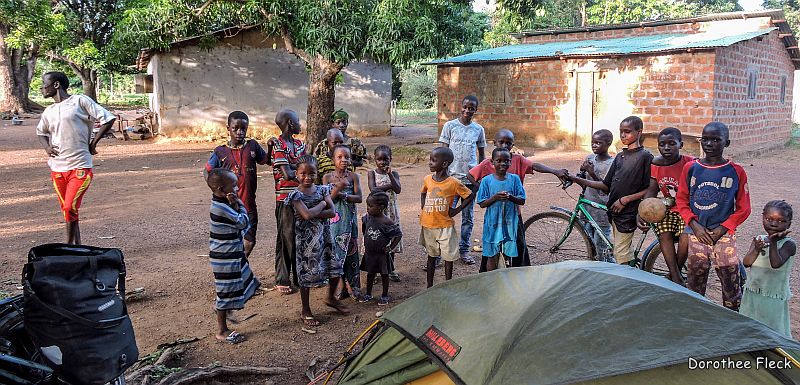
Heike:
When I am new in a country and I am not sure if it is safe or not, I often knock on doors. At the beginning of my last around the world bike trip I had a note where I explained who I am and what I am doing and that I am looking for a safe spot to pitch my tent. It was written in the local language.
I also used my picture book and pointed on a picture of a tent. I was very welcome most of the time and I had wonderful experiences doing so.
I pick the houses carefully. I only knock where there are signs of children or women. I never stay with only one man. (Having said this I did this once in Georgia but it was organized through the police, still I didn’t feel all that comfy back then)
But in most countries, there are lots of people sharing a house. And there are normally always women and children living there. I pick houses which are not too run down but also not to neat either.
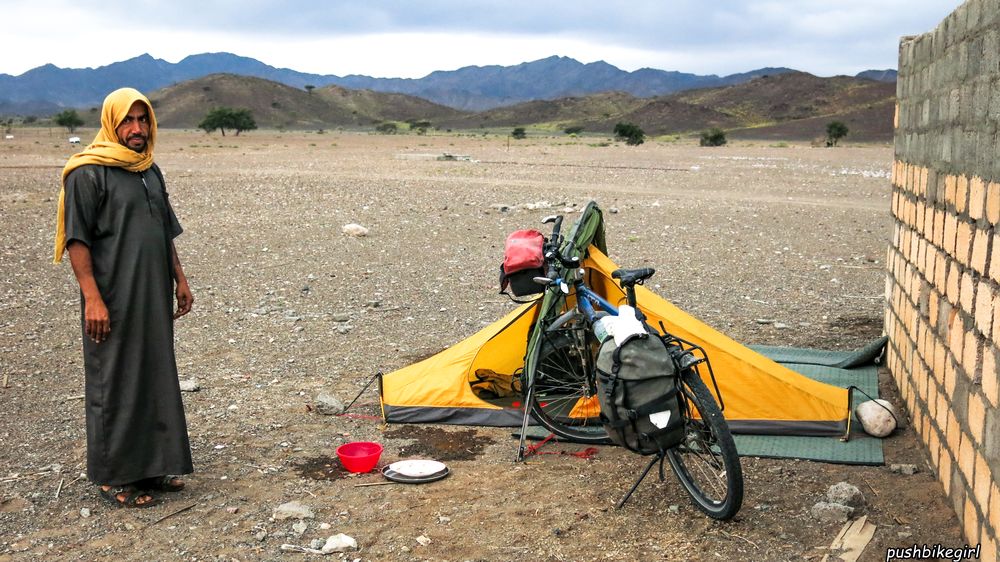
#4 What makes one country more difficult than the next?
Ewa:
The issue of sleeping in the wild and safety varies by region. While traveling in most places in Asia I felt much safer than in Europe and also took it easy as never before – the best places were Japan and South Korea where I slept in parking lots, children’s playgrounds and parks.
I have a theory that in those regions in Asia the sense of security has to do with religion (Buddhism) and the fact that alcohol is not, or not much in use. Alcohol changes people a lot and causes potentially dangerous situations.
I wouldn’t dare camp wild (even though I did) in Iran. Some men are totally unpredictable there. They can approach you more often for sex than anywhere else I have traveled.
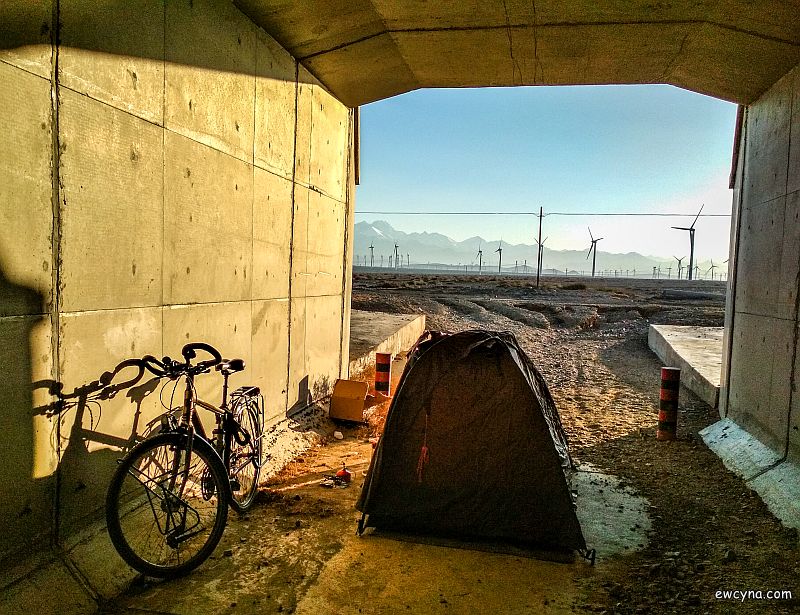
Kathryn:
For me Holland was the hardest because wild camping is illegal and everyone seemed to know this so I had to hide from the police and I hate hiding. I just don’t like feeling afraid and hiding gives me that feeling.
Morocco was a challenge because locals feared for me. They were most concerned with the wild dogs hurting me. I told myself I was the expert in doing this and to just do what I always did…just camp. But I stayed away from villages so fewer people were around and fewer dogs.
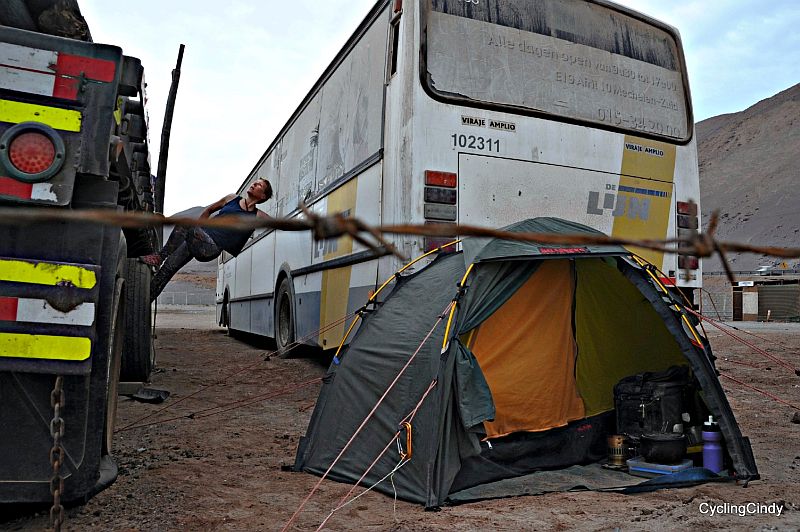
Cindy:
Wild camping relies a lot on common sense. I am not trying to be brave or making a statement. Most citizens of any given country will say it is dangerous to camp, so on this argument I cannot rely.
Usually, upon entering a country you will get a sense of how the people are. When listening closely to this feeling, it will tell you whether you can camp in the wild or not.
Countries such as Iran have different moral standards, and I believe it is not up to us, western single woman, to impose our perspectives on them. Of course, you can try and find out, but the consequences are yours to bear. I decided not to camp in Iran.
It is of course what my senses tell me about the men of a country when deciding about camping. I found in East Turkey, Iran and Northern Iraq that I was not quite comfortable with wild camping. Neither did I camp in India (except the mountain areas).
I decided not to camp in Nigeria for several different reasons, though none of them were related to the lack of decent behavior of (African) men in general. I was simply told beforehand that Nigeria is not safe and I wasn’t very experienced back then and followed the advice I was given. I might handle it differently now.
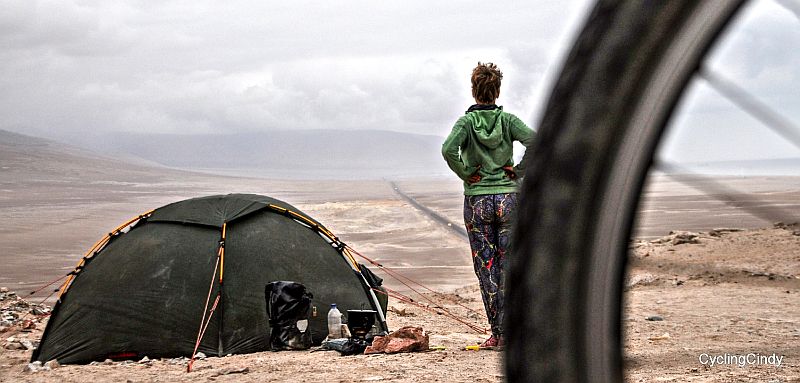
Dorothee:
Because of the high population in African countries (except Namibia) finding a remote spot for camping was difficult. Since they are very hospitable this didn’t bother me. It was opposite, I enjoyed most of the time camping in the middle of the village, learning more about their lives and cultures.
Asian countries are also very highly populated. You will find other nice spots there too and cheap accommodation.
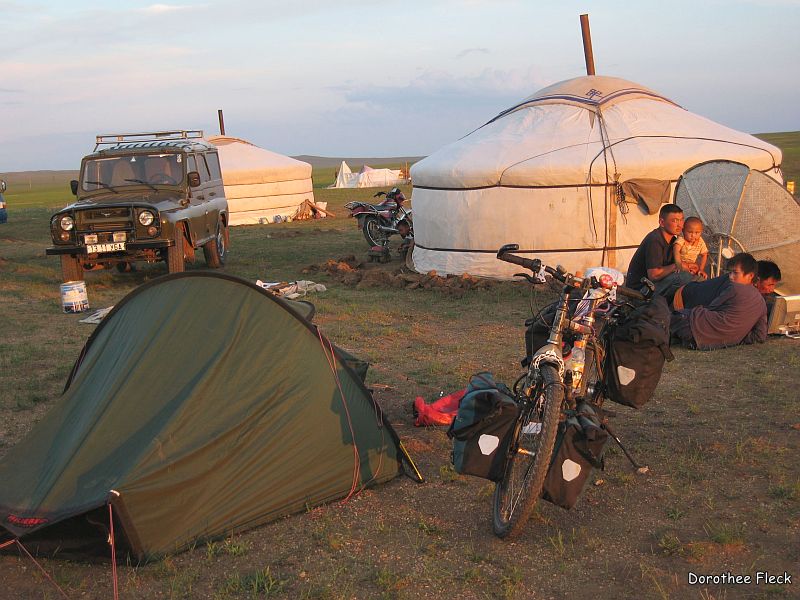
Heike:
I did not wild camp in Turkey or Iran – my feelings told me not to. But the people of Iran and Turkey are wonderfully hospitable so I always found a safe place for the night. People let me sleep inside their houses or in mosques.
I felt very uncomfortable in Far-Eastern Russia camping wild and preferred to stay in tiny hotel rooms or with people. But it was not always easy to find people who supported me and let me pitch my tent on their property. Alcohol is a big concern there.
Central America is very heavily populated and its reputation is not very good. I did not have any bad experiences but did not camp there (besides in Belize). Additionally, I was rarely invited. In the end, I had to stay way too often in small hotels which made it a very unattractive destination for me.
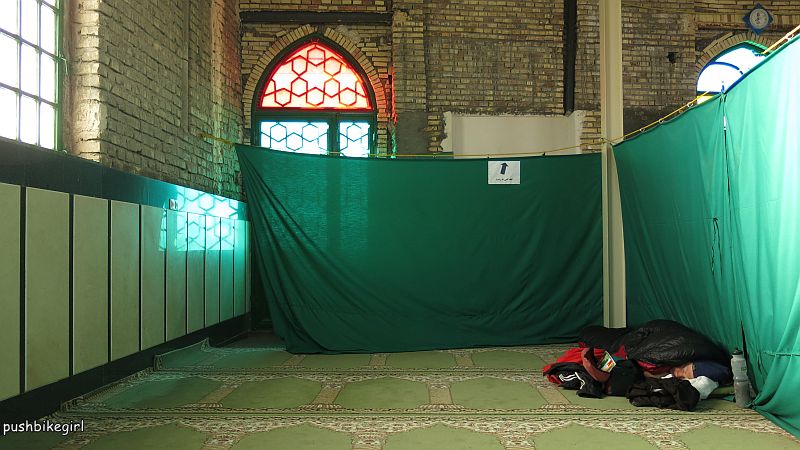
#5 Invisible or Not? And where’s my bike?
Ewa:
As for my bicycle at night all I do is attach it by chain lock to something, but since in most cases there’s nothing to attach it to I just put a lock on my back wheel so if somebody wants to cycle on it’s not possible.
Kathryn:
I don’t hide so I can’t help here. If I’m concerned about my bike, I connect it to my tent in some way with the tie lines or a bungee cord so someone will wake me up if someone tries to take it. But I rarely do that.
Blanca:
I always lock my bike and pass one of the guide ropes through the frame so that I would wake up if someone tries to take it. No one has ever come in the middle of the night and I don’t know what I would do if they did as it may not be safe to let the intruders know there is a single female in the tent. Luckily, I haven’t had any bad experiences so far.
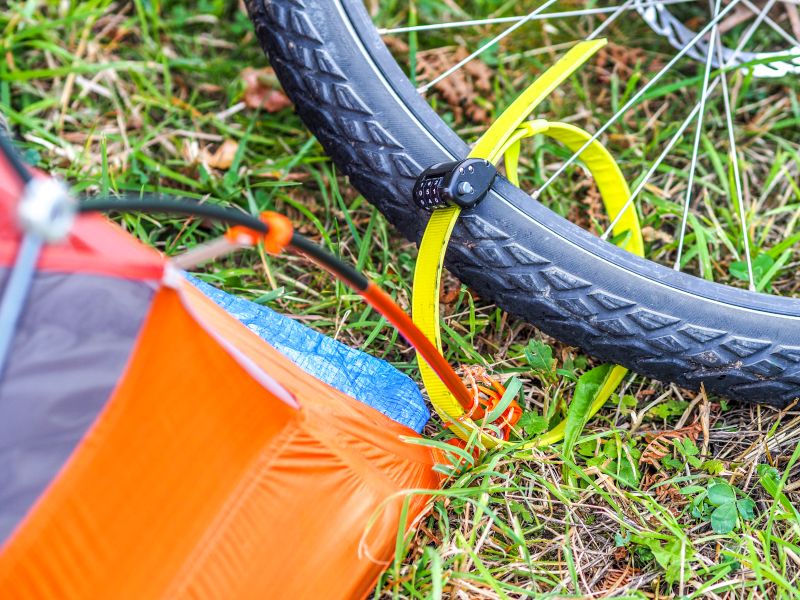
Dorothee:
I really don’t worry about my bicycle at night. I even leave my panniers on it. Who should steel it, if nobody finds me? If somebody finds me, they will be more interested in bothering me in my tent, than in my bicycle. Even when I pitched my tent in African towns, I left the panniers attached to the bike.
Cindy:
Sleeping in places where any other person can stumble through, leaves me with the uncomfortable thought of not having my desired privacy. Someone seeing me in my camp spot leaves me with a notion of someone stepping into my territory, a very uncivilized raw feeling of discomfort.
But there is more than that, others can also grab some of my gear, not the least of it being my precious bicycle. I make sure that such an attempt to steal from me, will not go unnoticed. So, I tie the bicycle to my tent: with one of the guy lines and a carabiner, to where I clip a tin cup.
Any clumsy behavior of a potential thief, a rough clunk will wake me up. Not to be seen where I am, I avoid standing near an artificial light or in the light beam of passing cars. I keep my fires small and I use a head-lamp with night vision function.
Although the size of my bicycle is tellingly small, I give no impression that I am a lone single woman. That means my underwear is not hanging out to dry, no shoes standing at the tent door and no typical female signs.
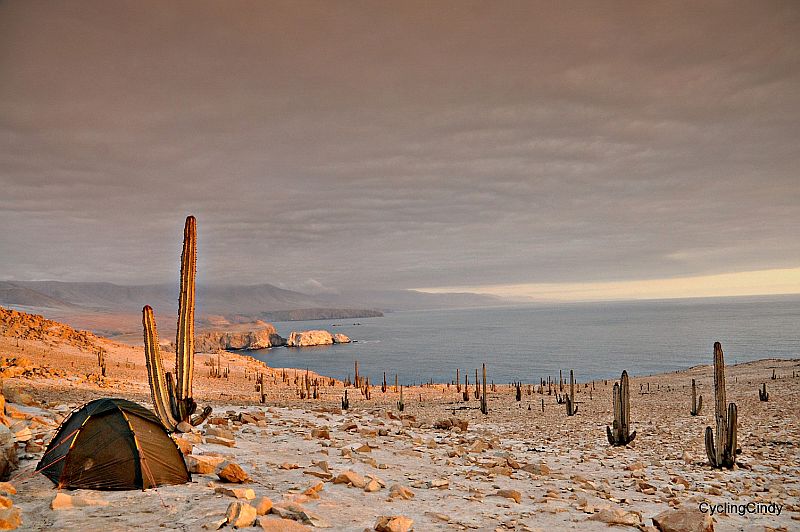
Heike:
I hardly ever bother about my bike. I might use the string of my tent to attach it to my tent, to be able to wake up with any movements of my tent, but most of the time I don’t care. Only when I am in towns.
Obviously, I don’t turn on the light at night. Don’t make noise, don’t make a fire. But only in very scary areas. Everywhere else a fire is part of my lifestyle. I even cook with a wood stove.
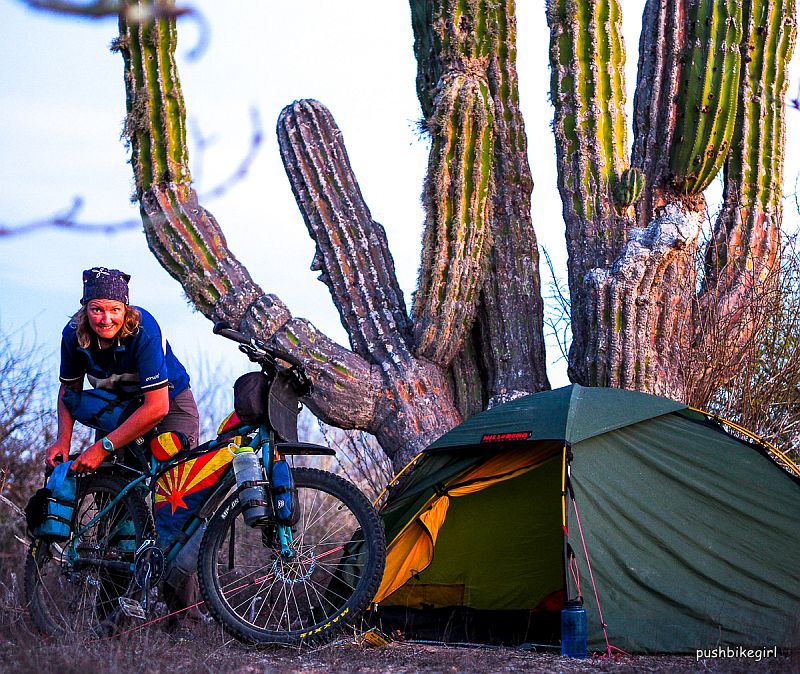
#6 Bad Experiences and Lessons Learned
Ewa:
Well, I had a few scary moments yes, but not many. One of the most unpleasant ones was in Montenegro, where I pitched my tent in the bushes by the coast. It was all ok the first night as I followed my rules (keep invisible) but it rained cats and dogs during the night so I stayed for a second one.
In the late afternoon I decided to cycle to the nearest village for water and do some grocery shopping. On the way back, I saw a car standing by the road at some distance not far from where my tent was but I ignored it and turned to my tent hidden in the bushes (according to my rule I should have let the car pass and waited until it was gone).
When I was back at my tent, I noticed a car driving towards me. It switched off the engine and lights and after some time in complete darkness I saw a man’s figure with his jacket hood up. He was not far from me staring in my direction and then he passed close by me. I was really scared and what was worse the batteries in my headlamp had died so I was in total darkness.
I grabbed my bag with my money and documents and started to run through the forest towards the road. I could hardly manage it as I wasn’t able to see much. When I reached the road, I tried to stop passing cars (there were not many) to help me – then I saw the car leaving the forest.
I hesitated what to do, my tent and bicycle were there, finally I went back and managed to pack everything very chaotically. I cycled on then to the nearest town and took a room.
What learned? “Stick to my rules not to be visible”. I didn’t do it, turned to my hidden tent and the guy noticed me. I was overall very lucky it ended well.
I had a few similar moments when somebody/a car arrived and saw me and I had to pack. In such cases I cycle on and sometimes I ask for help, local people or even police. At times it’s really difficult and tiring. Damn tiring.
But I’ve also had some funny moments pop up like this one, in Laos when I was climbing a long hill with not much possibility for wild camping, finally I found a spot in the bushes. But it turned out to be known by the locals for soon I heard a motorbike stopping and a Laotian man came in, spotted me, I said “hello” and he turned and ran as if terrified ??. So, I decided to leave.
Another time I pitched my tent at the entrance to what I thought was a closed restaurant by the seaside in South Korea but at 7 AM the next morning the owner came in and passed me pretending not to see me 🙂
Many people ask about wild animals. Well, even though I’ve cycled over 40 countries I haven’t been in truly dangerous places I think – I’d consider such maybe Alaska or Africa.
It can be most unpleasant when dogs find you. I talk to them calmly and give them some spare bread if I have some. It worked perfectly in the Caucasus or Turkey. These dogs when given food are then your best friend and sleep by your tent.
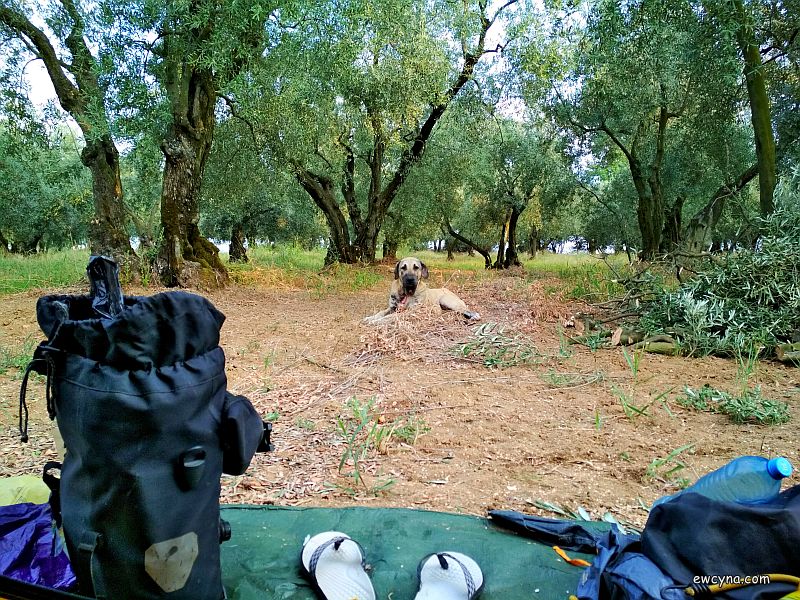
Kathryn:
Luckily, I can’t remember a bad experience. The closest I’ve come is to hear a car pull up to where I was camped near the water in New Zealand and hear car doors open and close. I waited. No sounds. I waited. Many minutes later I finally hear the car doors open again, someone mumble something to another person, the doors close and the car drove away.
What did I learn? No one is out to get me!
I’ll try to go deeper into my logic of not hiding. First, someone has to see me setting up camp and decide to come back and harass me…otherwise, once I’m in my tent they don’t know it’s a woman in there. Men don’t have that kind of energy or planning. Rapists aren’t running around looking for women to attack especially in the rural areas. And again, the safety is other cars coming down the road would see him attacking me.
In Morocco in the desert there’s not really any place to hide and one of my best nights was when a local Berber young man came by on his bike and made tea for me!
You can’t have this outside your tent if you’re hiding!
Cities are a different story and I rarely camp in them.
I’ve never heard of a woman being attacked in her tent, have you? The more I do it, but the safer I feel.
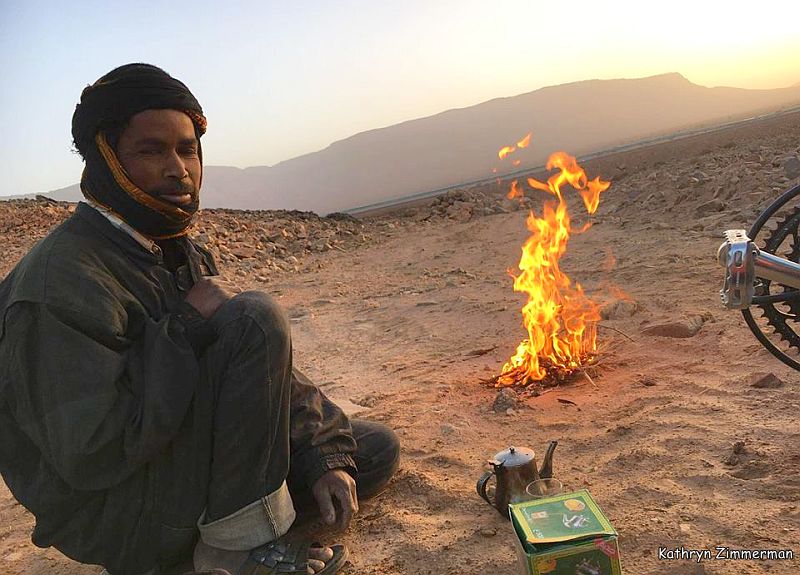
Cindy:
It happened a few times that I got very scared while sleeping in the open or remote places. Then I face the ‘reality’ and prepare for the worst, which is usually rape in my thoughts. I silently gather my most important belongings, such as cash, credit cards and SD cards, stuff them into my bra and am ready to run off as soon as I am attacked. But the reality always was different.
The mind loves to blow things up before they actually occur, making explosive scenes where worst case scenarios are going to happen… in the brain that is. This left me with a few sleepless nights depriving me from much needed sleep.
The best thing to do is to get out of the situation. The men who I thought to be rapists, were in fact so only in my mind. I left a camp spot only once, in the middle of the night, when I felt truly in danger for my life.
This was in winter in Patagonia when sudden snowfall burdened the tall trees around me. The snow was so heavy the trees started to uproot and to smash down around me. One loud whack after the other made me suspect someone was at illegal wood cutting. I took out my ear plugs and stuck my head out of the tent to see what was going on. In 20 minutes, I was packed and gone…
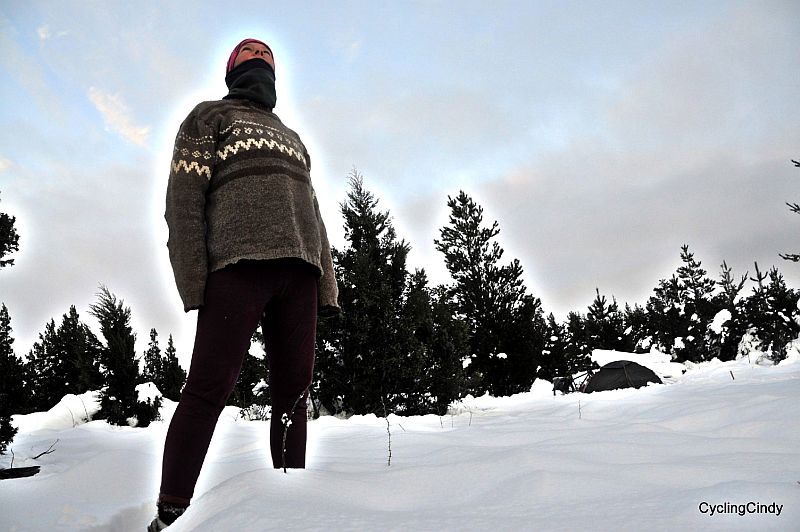
Dorothee:
I had some unpleasant incidents at night like gunshots nearby, timber robbery, men approaching my tent, shaking my tent… in these cases, I remain in my tent, silent, and hope they will give up and disappear and this was always the case. I believe if you stay calm, they quickly lose interest.
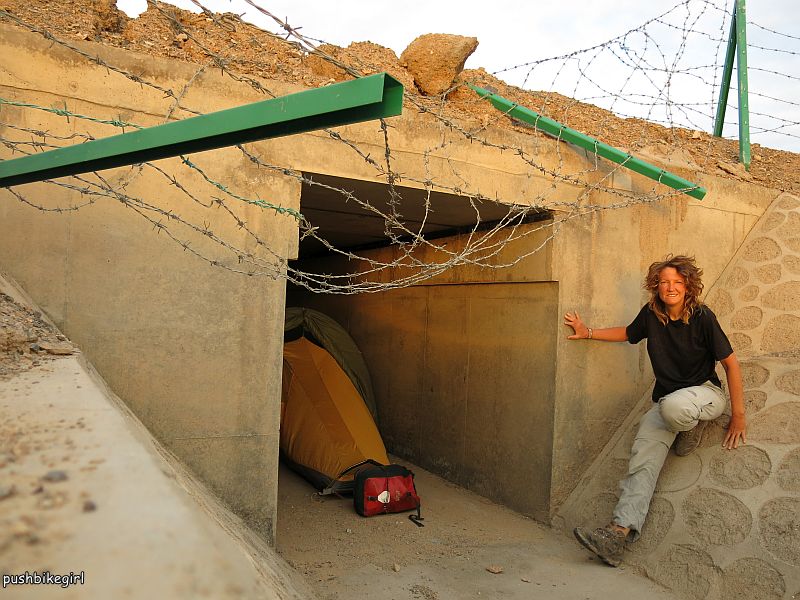
Heike:
I have been very lucky so far, having hardly ever had a problem. Most of the time it felt scary at the moment but it ended positive.
Hunters make me very nervous. Nothing seems more threatening than unseen hunters shooting in who knows what direction when you’re in the forest. Even though I would rather remain invisible when this happens, I shout as loud as I can to tell them I am there and don’t want to die.
One morning in a park in Japan I was confronted by a very weird man. I am not sure if he was on drugs, he was certainly not drunk. He insisted on trying to get into my tent, took off his shoes and tried to open the zipper of my tent.
I got dressed within seconds. Pushed him away and shouted at him and made lots of noise to scare him away and to make sure that people could hear me. I got out of my tent quickly and tossed his shoes away to distract him. He didn’t appear very strong so I pushed him several times and he moved off. I packed up within minutes and left the place.
Sadly, in that situation no one came to help me, even though there were many people around. Japanese culture is very different.
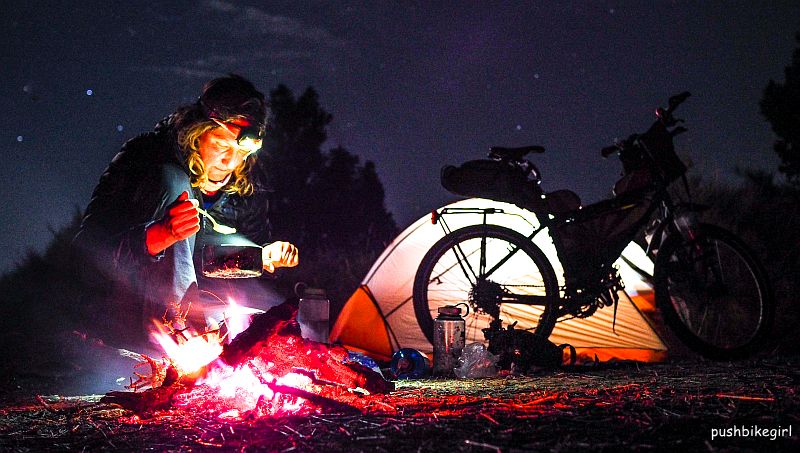
#7 Remember
Please keep in mind. We are all experienced solo female cyclists. We have been riding for many years in very different environments, countries and cultural surroundings and practiced our wild camping abilities very carefully.
In some ways we have the same techniques but in others we differ a lot from each other. Some of us might have been in more dangerous areas than others or they might fear more easily. What counts for the one must not work for you or me?
If you like keep those practices in mind when you are out there – but find your own way and never go too far beyond your comfort zone. Best is always trying to lose fear in an environment you know best.
One step at a time – that’s where we all started.
If you have further questions feel free to ask them in the comments below.
Happy exploring!
More about Ewa, Dorothee and Cindy and many other experienced solo female cyclists here: Interviews
Kathryn and Cindy sharing her tips & tricks & hacks about bicycle touring
Cindy shares more of her knowledge in meals on two wheels and in our video interview
Ewa gives insides in optimizing gear for your bike touring trip
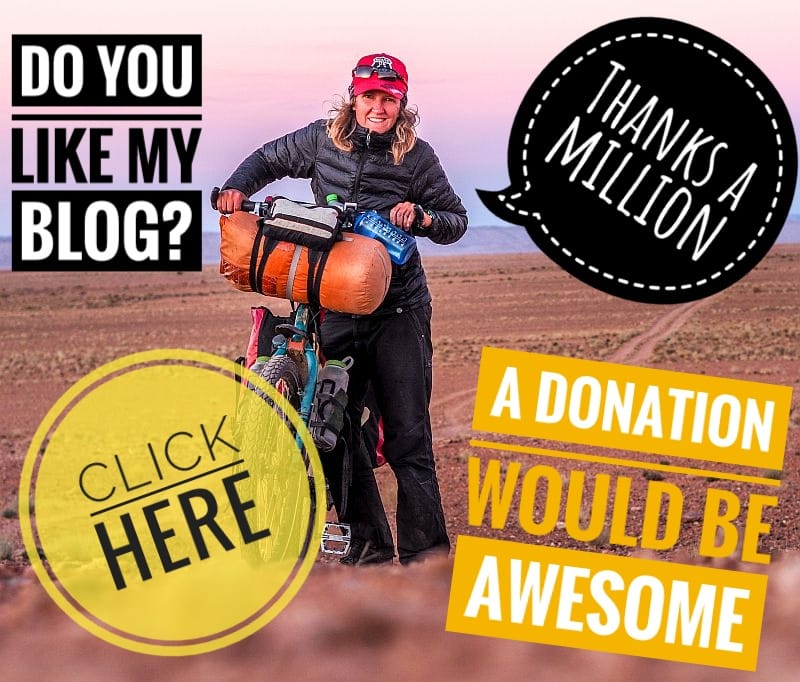
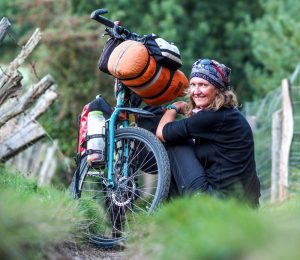

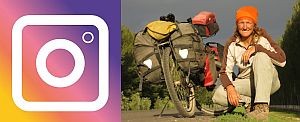
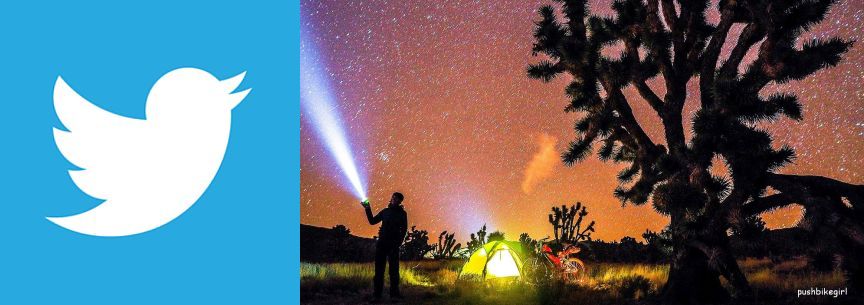

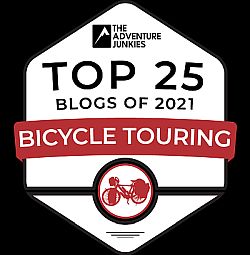
Heike,
Always a treat to read your stories and shared stories of other incredible cyclists.
Thank you,
Dave ( Canada, Ontario)
Thanks Dave! Appreciate your comment…..Cheers Heike
Dear Heike,
Very I inspiring journal. Very much enjoyed reading about the various women, including yourself, in this article. It is also helpful to read about the tips and ways each woman takes in various environments. Again, very inspirational and motivates me for the future .
Thank you once more. I can see this must be a lot of work to collaborate. So well written. Thank you!!
God Bless,
Anita
Thank you Anita – glad we were able to help!
Best greetings Heike
Thanks everyone for sharing. All have great advice and experience. Glad to hear no one has been harmed by anyone. I too was told by many that they think it would be dangerous, but I agree that it’s all in people’s heads and if you act rightly for the situation you will more than likely be left alone and unharmed.
Happy trails to all of you inspirational riders. ??♂️ ? ?
🙂
Thanks for all your wishes Rob…..happy weekend!
Cheers Heike
Thank you for sharing your adventures and experiences! It is such an inspiration!
Thanks for the great feedback Connie!
Cheers Heike
Heike, these collaborative blog post must be quite a bit of work so, thanks for the extra effort to bring them to us. Lots of good information here even for us male cyclist. I have only toured a tiny bit compared to these ladies and yourself but wild camping is certainly an integral part of any long tour, and I love it.
Thanks Heike and I’m looking forward to seeing your 1st post from Morocco!
Hi Ron….yes blogging is work 🙂 Thanks for noticing 😉
Glad we could give you some informations…..
Best of luck for your next big tour….
Heike
Excellent sharing…… Very good & helpful for others ….. Keep peddling …..
🙂 Thank you and you too!
Best greetings Heike
Thank you for this! So awesome to read about other female solo cyclists. I am leaving next year, to cycle South America. I have cycled the west coast of the U. S. and some countries in europe. But never really wild camped. Reading this made me really comfortable. I am always positive and in all the travels I have done, having a positive mindset has always brought positive moments.
I am so excited for my next adventure and i am sure I will think of this article, when I am out there, sleeping in my tent 😉
Best of luck for you Lisa……Happy nights in South America……Heike
Dear Heike,
Thank you so much for this article, it is very interesting. You all are such brave women and I admire you so much. You all are such an inspiration for me 🙂
Safe travels!
Happy to hear this Marija….enjoy the nights in nature….
All the best Heike
Thank you for sharing your expierences. I had only a few scary nights in my tent during my tours and the outcoming was allways positive.
And it is true I also never heard a solo female traveler got attacked – luckily. Simply hope it will stay that way.
Enjoy the stars…..thanks for sharing your experiences…..Cheers Heike
All you are really courageous cyclist. Thanks for sharing your experiments. As a man I did wild camping all types you did but only Turkey, Europe and Tunis. My favorite is to get permission garden owner or neighboor of puplic places. Have never bad experience. Best wishes all you are.
Yes asking for shelter is often very easy! I am happy to hear this also works for a man!
Happy camping….Cheers Heike
Brave girls! It’s fantastic to read about your courage, but also about wisdom, passion and making your dreams come true. Stay safe!
Thank you very much….and you too!
All the best Heike
Liebe Heike
Grossartig, dass du diese Erahrungen zusammenbringst. Und was mich am meisten erstaunt, ist das Alter all dieser Ladies. Das inspiriert! Herzlichen Dank!
Weiterhin gute Fahrt und gute Nächte.
Liebe Ursi – ja, Alter haelt nicht davon ab unterwegs zu sein!
Dir viel Spass……LG Heike
Brave! congratulations for your hard work on this blogue.
THanks – yes took a bit 🙂
Thanks for sharing this information! If I (or any female for that matter) wanted to start cycling and camping in other countries, which country or region would you recommend for a ‘beginner’? Is there any country/region that is easier and a good place to start? Thank you.
Hi Anna, thank you. I would recommend to start in an area you know best. In your own country or a country with similar culture to your own. Once you feel comfortable in your own territory you can start exploring more exotic places.
Good luck – if there are more questions – please ask.
Cheers Heike
Thanks Heike!
Thanks for the nice blog. I wonder if camping in Denmark, Germany and Netherlands also requires such ‘invisibility’ tricks? For my journey from Denmark to Belgium, I am thinking of camping a few metres away from the cycling path and making some fire for warmth. But this would be a very bad idea isn’t?
You will find out soon how you feel like.
I would probably do it also – but there is never a 100% guarantee!
Making fires is a problem in overpopulated areas – I don’t think you will make a lot of friends if you are lighting up a fire in those countries…..
Happt riding Heike
Very instructive blog. I am reminded of the subconscious and often constant concern for safety that persists with some people. Men are concerned about safety too but this article raises the bar considerably for women. I agree, most people are fair and friendly but there are bad players out there. Good luck helps, but the common sense tips you have highlighted will serve any lone traveller well.
Thanks for your feedback Peter – sure men are concerned too!
Most people are super!
Best greetings Heike